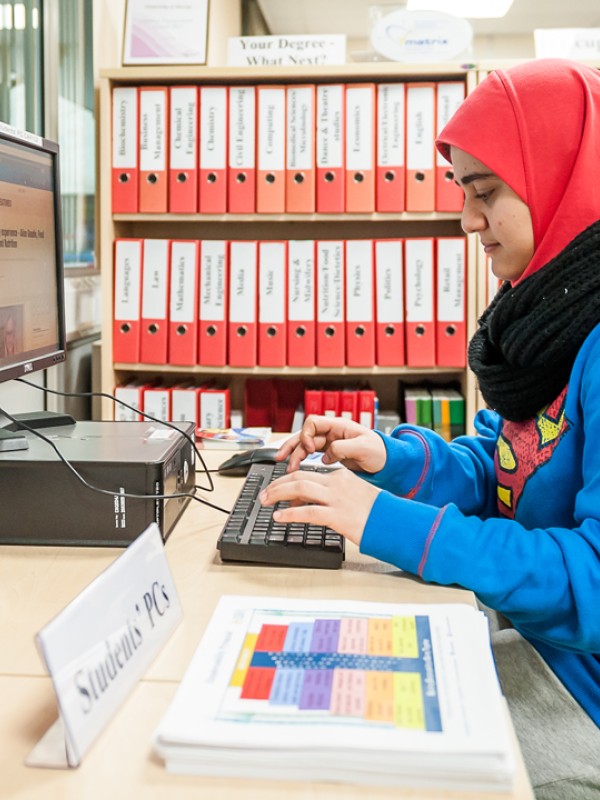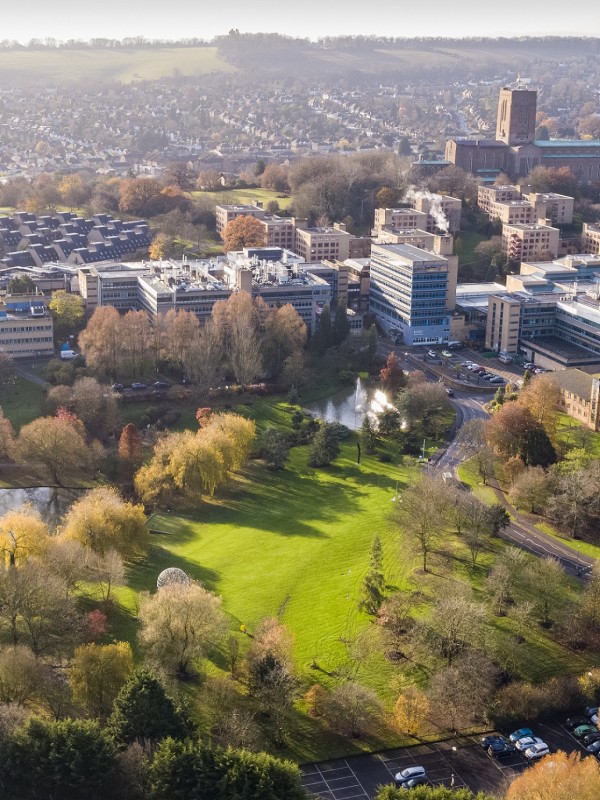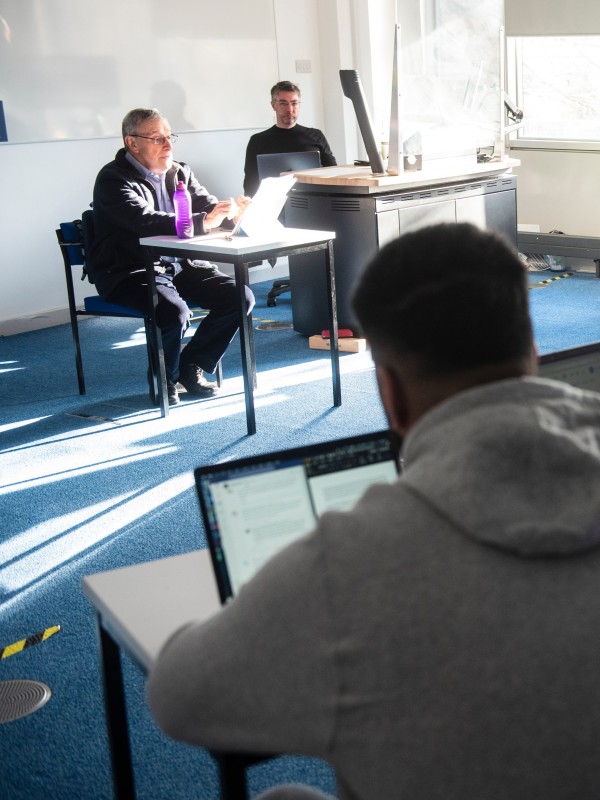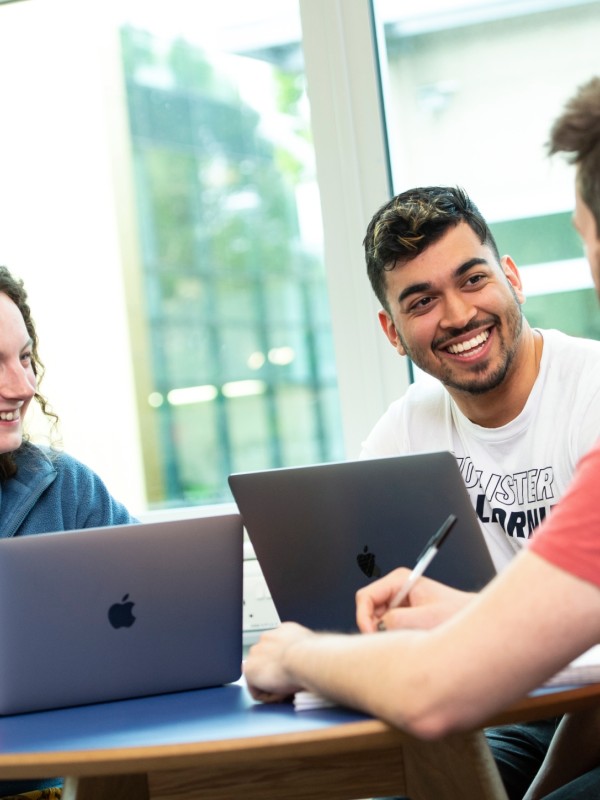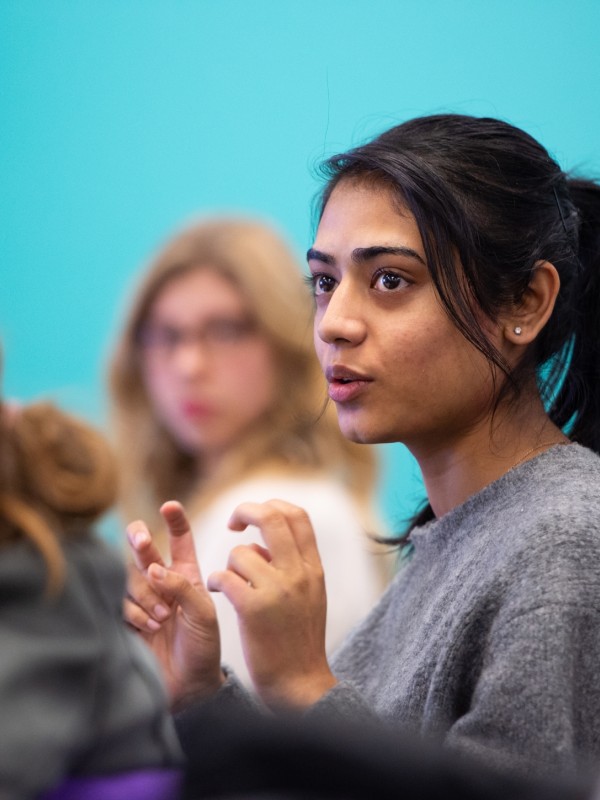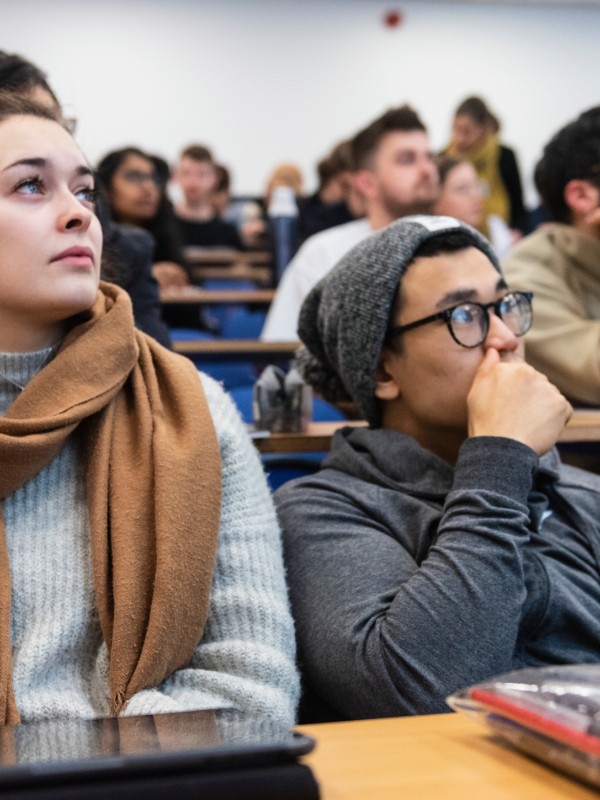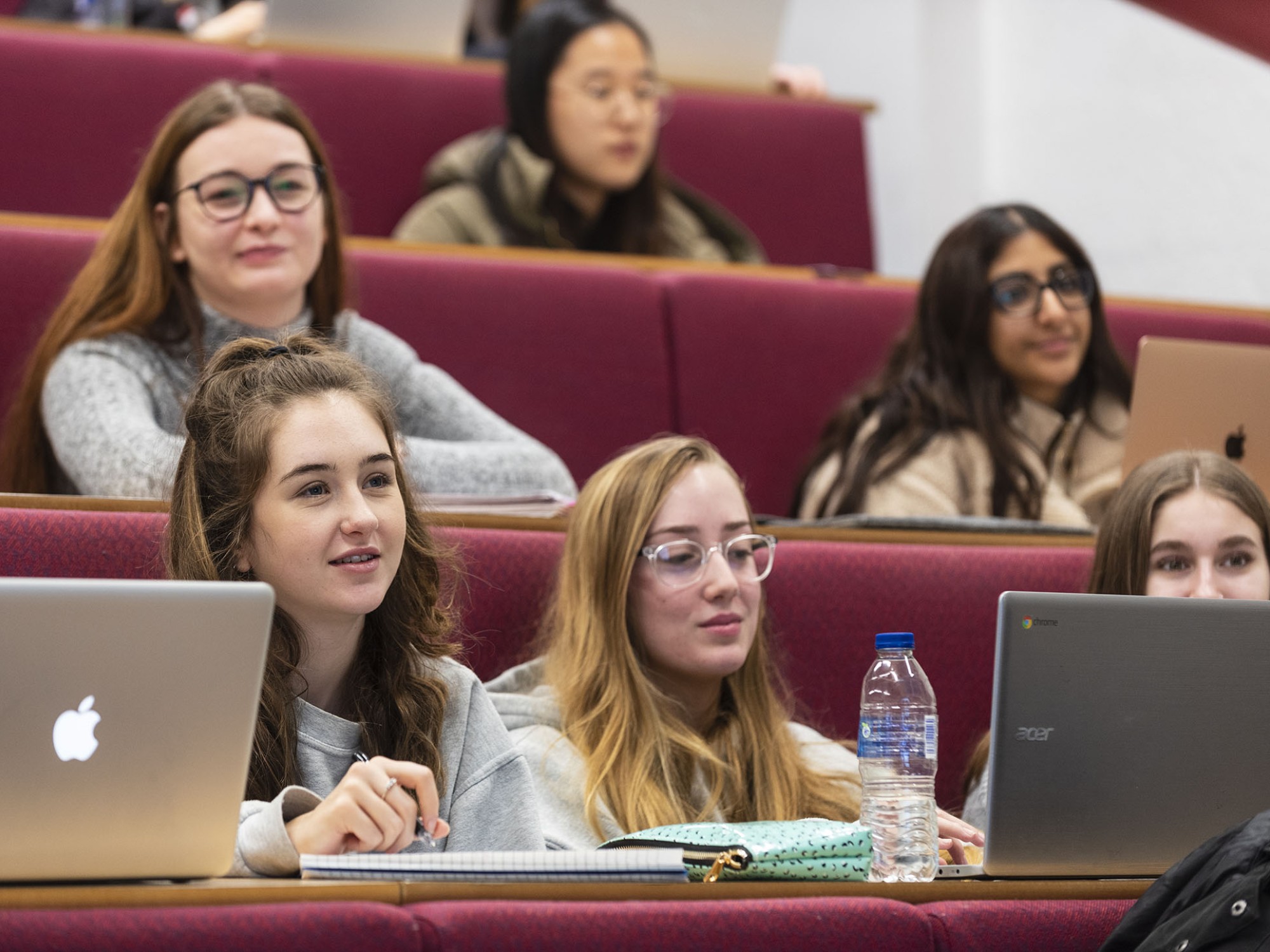
- Politics and Economics
BSc (Hons) — 2026 entry Politics and Economics
Across the world, politics is increasingly driven by the dynamics of economics. Our BSc Politics and Economics degree focuses on how the interaction of political and economic forces shape societies nationally and internationally. You’ll learn how to apply tools of political and economic analysis to public policy issues, and explore how those who make decisions impact on others.
3,905+ people have created a bespoke digital prospectus
Why choose
this course?
- Politics and economics is about money and power: political choices fundamentally determine the economies within which we live and work; yet often economic reality seems to shape the limits of political possibility.
- Take the opportunity to get industry-ready with our award-winning Professional Training placements.
- Our course will introduce you to the most important public policy questions in the UK, around Europe, and the world, and explore how political and economic decision-makers' impact on others.
- Along the way, you’ll be able to address the economic and political issues behind the biggest debates in contemporary society.
Statistics
1st in the UK
Politics is ranked first for student experience in The Times and The Sunday Times Good University Guide 2025
4th in the UK
Politics is ranked 4th for overall student satisfaction* in the National Student Survey 2025
Career prospects
92% of our Politics and International Relations and 91% of our Economics students are in employment or further study within 15 months of graduating (Graduate Outcomes Survey 2025, HESA)
* University of Surrey analysis of NSS data: % of Q1-24 answered positively for institutions listed in the Guardian University Guide
What you will study
Our BSc Politics and Economics degree will provide you with an in-depth understanding of core political and economic concepts, theories and methodologies. You’ll then be able to specialise in a wide variety of areas, from political economy and financial markets through to international organisations and international trade.
Our degree has Bachelor of Science status, in recognition of its technical analytical components that are highly valued by an increasingly diverse range of employers in the knowledge economy. You will develop transferable qualitative and quantitative research skills, and learn how to design and carry out research projects using market-leading data analysis software.
Our curriculum is research-informed and student-led so you can tailor your degree to your own interests and passions.
Your time will be split equally between modules in politics and economics. This will allow you to draw links between the two both in the theoretical and applied fields of study.
You’ll be provided with the knowledge necessary to tackle some of the most pressing questions that confront us today, from the role of markets in civic life to the existence of rationality in decision-making.
Which politics and international relations degree is right for me?
We offer a range of pathways to study politics and international relations. Let us take you through the differences between all of our courses so you know what makes each of them special.
Our Politics and Economics undergraduate degree offers a range of compulsory and optional modules to enable students to gain a comprehensive grounding in the discipline at the same time as tailoring their studies to their specific interests.
The academic year is divided into two semesters of 15 weeks each. Each semester consists of a period of teaching, revision/directed learning and assessment.
The structure of our programmes follow clear educational aims that are tailored to each programme. These are all outlined in the programme specifications which include further details such as the learning outcomes.
Please note: The full module listing for the optional Professional Training placement part of your course is available in the relevant programme specification.
Modules
Modules listed are indicative, reflecting the information available at the time of publication. Modules are subject to teaching availability, student demand and/or class size caps.
The University operates a credit framework for all taught programmes based on a 15-credit tariff.
Course options
Year 1 - BSc (Hons)
Semester 1
Compulsory
This module introduces students to core elements of economic theory which forms the basis of the Macro and Micro modules in the Semester 2 of first year. Understanding a number of concepts, like specialisation, markets, competition, rational behaviour and the structure of the economy are key learning outcomes from this module and prepare students for further study in Economics and related subjects.
View full module detailsThis module ensures that every student acquires the basic mathematical and statistical skills necessary for their subsequent modules, irrespective of their prior education. Students will learn to solve mathematical optimisation problems, which lie at the heart of every economic model. This module will provide students with techniques for maximising real-valued functions with one variable; functions with several variables will be covered in subsequent modules. Economic applications of the mathematical techniques are emphasised throughout.
View full module detailsThis module offers an introduction to British Politics, exploring the key institutions of the political system (monarchy, Government, Parliament, parties), recent political challenges (Europe, the role of the media, devolution) and options for reform. We will also examine the role of non-state actors in reshaping British politics; from environmental and sustainability activism to public petitions.Students will cement their knowledge of our parliamentary democracy and place this in the current political context. The module content links to other modules of comparative politics, public policy and political science in Levels 5 and 6.
View full module detailsSemester 2
Compulsory
This module introduces students to a range of mathematical techniques and concepts required for the effective study of economics. It demonstrates the role mathematics plays in the formulation of economic theory and subsequent analysis. The module builds on the mathematics students have studied in the first term of Level 4 and gives students the mathematical tools needed for the study of economics at Level 5 and 6.
View full module detailsThis module builds on the Introductory Economics module by extending the analyses of microeconomic concepts. In particular, it looks at the firm’s supply decision (involving cost and production), and the effect of market structure on the firm’s demand, studies labour markets and explains the constrained optimisation model of labour supply, introduces students to how to model risk and information problems, and covers aspects of welfare economics and market failure (with an application to the environment). The module uses maths from the Quantitative Methods and Maths for Economics modules to demonstrate the role maths can play in economic theory; and makes use of examples from empirical research, reports and news media to illustrate some of the concepts covered. By doing this, the module provides a firm foundation for more advanced microeconomics as the programme proceeds, and for optional modules that apply microeconomic principles.
View full module detailsIn this module we pose the 'big' questions about the economy, study the relevant data, build models that help explain what we observe, and evaluate these models.
View full module detailsSemester 1 & 2
Compulsory
This module offers students a first introduction to the study of political science, with an overall objective to set the foundations for developing a cultural and global diversity mindset, employability skills, digital capabilities, sustainable thinking, resourcefulness and resilience in the study of politics. Students engage with a set of key concepts of political science, questions and debates at the heart of the discipline. The module is a foundational window to the functioning of political systems and processes, key theories of political science and insights into the way important societal developments affect politics in any country context. Moreover, this module will teach and encourage students to start critically reflecting on social and political trends around the world, as well as set the foundations to become independent thinkers in analysing political developments and events.¿ It simultaneously introduces students to some of the most relevant issues and debates surrounding challenges to representation across different global and cultural contexts. Drawing on different perspectives from across political science, this module offers an opportunity to consider the ways in which citizens' opinions and preferences are constructed, as well as how politics and political agents account (or not) for them. The module will employ a mixture of case studies from different national contexts and largely rely on comparative evidence as well as simulation scenarios to explore key issues and deepen students' knowledge of representation and its challenges. The case studies are designed to build more general critical thinking and analytical skills that students can use to form their own understanding of various aspects of representation and some of its principal challenges, being able to transfer learnings and skills forward to other modules as well as further afield in their career.
View full module detailsYear 2 - BSc (Hons)
Semester 1
Compulsory
The module builds on the first year microeconomics modules and serves as a foundation for subsequent study of microeconomic topics within the relevant degree programs such as consumer choice and game theory. The module uses some mathematical techniques (from the Level 4 Mathematics modules) and graphical analysis.
View full module detailsThe module progresses naturally from the macroeconomic models already encountered in first year Principles of Macroeconomics (ECO1019) to build intra-temporal and inter-temporal macroeconomic models from microeconomic principles to explore various macro topics, such as credit market, social security, banking, inflation and economic growth, and examines how macroeconomic policy influences economic performance. It serves as a foundation for Intermediate Macroeconomics 2 (ECO2046).
View full module detailsThis module enables students to gain a solid understanding of key theories of International Political Economy (IPE) such as Mercantilism, Liberalism and Marxism. It strongly emphasises the political, philosophical and ethical aspects of IPE and is therefore more in-line with studies of Political Theory and Philosophy rather than Classical Economics. It therefore builds on a good understanding of International Relations, the links between history and theory and experience with empirical case studies acquired in POL1013. It deepens knowledge in political and social philosophy acquired in POL1014, specifically on questions of liberty, welfare, and justice. The acquired knowledge should be applied in a critical fashion for the analysis of case studies. Multi-national corporations and institutions in the International Trade and Monetary System are introduced as key actors in the international political economic environment. Students will be able to discuss and debate the role of these institutions in the development of, and their behaviour during, crises, with focus on the Asia-Pacific region. Current and future challenges to the status quo of IPE are discussed as well. The acquired knowledge on state and market relations, the focus on non-Western case studies together with presentation and communication skills directly link the module to Level 6 modules POL3090 and POL3072.
View full module detailsEconometrics is a research tool that involves the application of statistical methods for the analysis and critical evaluation of datasets. Econometrics is used by social scientists, particularly politics, economics, sociology, in order to explore competing hypotheses and generate predictions applied to real world puzzles. This module is designed for Level 5 undergraduate students specializing in politics and economics who want to work with quantitative data, gain a substantive understanding of the theory and practice of econometrics, learn how to use statistical inference and econometric analysis, and build awareness and expertise in testing hypotheses relying on evidence-based research. Understanding econometrics is recognized by economists and quantitative political scientists as an essential skill, which allows students to obtain an understanding and appreciation of econometric research applications, develop the ability to critically evaluate existing econometric research and policy analysis, and gain the skills to identify shortcomings and problems with studies and assess the confidence that should be placed in the proposed recommendations and conclusions. This module will also provide students with the skills necessary and the practical experience of using quantitative data and techniques of analysing it. This way students will learn new in-demand skills, not only for their studies but also skills they can highlight in their CVs. The course uses the statistical software RStudio, and you will learn how to critical evaluate research questions by using them most important surveys available. Students will also learn skills they can apply into assignments during the final year of their studies an in the job market.
View full module detailsSemester 2
Optional
Macroeconomic policy and performance are fundamental to our daily lives. This course gives the students a systematic way of thinking about macroeconomic issues. The students will be able to derive macroeconomic models based on the behaviour of economics agents. The students will end up with a model that they could can use independently to understand macroeconomic behaviour and policy issues in the real world.
View full module detailsThis module will build on, and extend, what students have learned in previous microeconomics courses. We will continue to study how agents make optimising decisions, but here with a focus on how those decisions can be inefficient when there are market failures, as opposed to the perfectly competitive world that students have mostly studied before in, for example, the Microeconomics module in the previous semester. Some prominent real-world examples are environmental externalities, or the provision of public goods. We will also explore common mechanisms that have been developed to try and move decisions to more efficient outcomes; for example taxes, tradable permits, preference revelation mechanisms. We will study how societies, rather than individuals, can make collective decisions over resource allocations when preferences differ across the population – again, particularly relevant in the case of public goods. Some of the topics may have been touched on in level 4, but students will see how learning progresses by looking at topics in more detail and with more rigour. Paralleling this, the learning outcomes in this module will provide a basis upon which to build for some of level 6’s microeconomic-based modules.
View full module detailsThe module lays a theoretical foundation for empirical studies of modern governmental structures. It offers students an understanding of the structures of governments, the variations in state organisation, governmental forms and party systems. In particular, it will examine the main elements of the modern democratic state in a comparative manner, stressing both the commonalities and differences between systems around the world. Technically, the module will provide students with the basic ideas and skills that will serve them for further study of both comparative government and individual case studies, as well as introducing them to core literature in the field. The mdule seeks to develop research and analytical skills useful to the research of comparative politics. It also expands notions of democracies to discuss non-Western democratic models and key examples from authoritarian and illiberal states from around the world to discuss democratic challenges. We bring forward comparative analysis on social movements and political participation, highlighting movements like gender and race equality, autonomy, environmental and climate change movements, from a comparative point of view, including the value of protesting. We focus therefore both on the formal and informal side of political life with a view to master comparative research techniques.
View full module detailsThis module builds on students’ existing knowledge of electoral systems and voting behaviour. It will give students an understanding of the implications of the use of particular electoral systems in different contexts and how people vote. Through the examination of existing theories and analytical frameworks, students will develop their ability to analyse the results of contemporary elections. Students will develop their ability to analyse the results of contemporary elections, the emergence on new political parties, and the contemporary developments in party systems. The module enables students to critically apply key voter’s behaviour theories to contemporary elections and understand strategies through which participation in voting can be encouraged. Together we will examine both parties and voters, and through the analysis of case studies we will examine contemporary debates on voting behavior. The module complements and expands elements of UK politics electoral systems featured in POL1017 (Debates in British Politics) and on theories of voting behaviour such as rational choice which have been discussed in POL1012 (Introduction to Politics). There are no pre-requisites for this module. Students have the opportunity and are asked to carry out independent research.
View full module detailsCommunication is a key skill in the information society, from making sense of the world around you to making yourself heard in different settings, including university, work, with friends and family, and in society. This module will introduce students to key concepts in communication as they are relevant to communicating in 21st century society. Accounting for the fact that most of our communication is mediated in some way, the module will give students a strong contextual understanding in mediated communication. This is followed by an interdisciplinary approach to communication in which students will learn about the way we communicate and understand communication in a range of areas, including business, medical settings, science, language, and psychology.
View full module detailsThis module develops students' understanding of international security through a focus on the ways in which international relations is shaped by great powers. By studying how the United States, Russia, and China, define their interests and approach to international order, the module places its emphasis on the practice of international security in a series of flashpoints and crises in which great powers' security relations interact. Students will understand the security implications of resource scarcity and the globalisation of production. The module includes a crisis management exercise in which students are tasked with managing an evolving security crisis in real time.
View full module detailsThe 'long' 20th Century was full of contradiction: devastating world wars, intra-state conflict, revolution and economic disaster were met with recognition of the right of peoples to determine their own future, of an international human rights agenda, of unprecedented systemic institution-building in order to promote and perpetuate peace and economic growth that extended far beyond the ¿first world¿. This module will review key events and processes shaping the evolution of contemporary international society in order to identify and understand the circumstances under which such major change came about. Students will be required to acquire a detailed knowledge and understanding of international history and actors in the twentieth century, developing, applying, and historically contextualising their knowledge of International Relations theory. The module engages the global and cultural structures of power within which the discipline of International Relations is embedded; the evolution of capitalism and the sustainability of contemporary international political economy; and the resourcefulness and resilience required for processes of revolutionary change.
View full module detailsOptional modules for Year 2 - FHEQ Level 5
In Semester 2, students must choose only 1 optional module from Economics: either ECO2046 or ECO2051.
They should choose 3 optional modules from the remaining Politics and Sociology options.
As part of your optional module selection, you are able to choose up to 15 credits from our range of interdisciplinary modules (subject to availability). For more information please refer to the website (https://www.surrey.ac.uk/personalising-your-degree-university-surrey)
Year 3 - BSc (Hons)
Semester 1
Optional
This module develops equilibrium concepts for static, dynamic, complete and incomplete information. These are applied to various aspects of economic importance: markets, bargaining, job-market signalling, expert advice and electoral competition. The module will advance students’ knowledge of microeconomics.
View full module detailsFollowing one of the most controversial administrations in recent history, this module situates the Trump presidency in the context of other executives and considers to what extent this period was a major departure for norms and strategy in US foreign policy. It considers recent history, theory and key concepts to reflect on the impact both for US power projection, and on world politics more generally.
View full module detailsThe module will cover the basic elements of negotiation, using a combination of theoretical and practical methods. The module introduces theoretical approaches to negotiation, before exploring and illustrating them through active usage in a series of games and exercises. Negotiations in class (weekly) as well as online (throughout the duration of the semester) allow students to address real-life political issues in the form of simulations. The taught theoretical insights are put to practice with tailored seminar activities. More importantly, students are required to evaluate their practice in a self-reflexive critical portfolio that will be based on the experience built throughout the semester. This will test their grasp of the topic as well as give them the opportunity to consider how it will inform their future practices as a 'negotiator' within employment.
View full module detailsIn a time of increasing challenges to the core components of representative democracy, this course provides an introduction to populism in theory and practice, employing an increasingly consensual ideational approach to populism. It introduces participants to an extensive conceptual debate, historical and current populist forces, their characteristics, causes and consequences, as well as the often-ambivalent relationship between populism and democracy. This course aims to introduce students to some of the most relevant issues and debates revolving around populism, its causes and consequences. Readings and activities have been carefully selected to deepen students’ knowledge of specific cases. They are also designed to build more general critical thinking and analytical skills that students can use to form their own understanding of the relationship between populism and democracy, as well as present their views in both oral and written formats, developing a global perspective on a topical issue of political culture. To do so, this module addresses the following main issues: concepts of populism (assessment of definitions and presentation of populism as a set of ideas) overview of populism amongst the masses and elites overview of populist forces in Europe, Latin America and the USA causes of populism consequences of populism, and most notably its ambivalent relationship with democracy implications of and responses to populism
View full module detailsThe module broadly covers two parts. In the first part we concentrate on the theoretical foundations of international trade, i.e. address the questions “why do we trade” and “is trade good for us”. In the second part we focus on the policy instruments that are available to the designers of trade policy; our analysis involves issues related to the potential costs and/or benefits to a range of stakeholders of trade barriers, e.g. tariffs and quotas. We also investigate the issues of international trade agreements.
View full module detailsThis module is concerned with understanding the role of leadership in the contemporary political environment. Much attention tends to be absorbed in observing institutional factors driving change, such as parties, parliaments and demography. However, this module establishes leadership as a vital factor in politics. This unit explores the various theoretical perspectives on the role of political leadership, including charisma and psychological approaches. It uses a range of examples to illustrate key dimensions of leadership and considers to what extend the requirement of political leadership have changed in response to the contemporary political environment. By examining leadership from a gender and dyadic perspective, the module also considers whether some nations have an issue in the accessibility of (and therefore representation by) leaders. It also examines key issues political leaders face; from exploring how they cope with conflict to how they keep their hands 'clean' of corruption. It also considers ways in which we can quantify how successful a leader is. There is a focus on key issues in contemporary political events and case studies will be situated throughout the module.
View full module detailsThis module introduces students to the field of behavioural economics which incorporates psychological evidence into economics. The standard approach in economics explains market outcomes and economic decision-making using theoretical models which usually assume that people are fully rational. Behavioural economics, on the other hand, seeks to increase the explanatory power of traditional models by considering a number of real life decision making situations where some standard rationality assumptions on preferences do not hold. This module builds mainly on the individual decision making models taught in microeconomics and financial economics modules in year 1 and year 2, identifies departures from these classical models, and use them as an inspiration to create alternative theories of decision making.
View full module detailsThe module examines the nature and behaviour of households in modern economies. It will use economic theory and empirical evidence to illuminate why families are organized as they are and how this has changed in recent years. This will encourage students to adopt a critical perspective on the patterns they see in society and in their personal life. Students will make use of the Microeconomic knowledge and Econometrics skills that they have developed in Level 5, applying them in a new context. The research focus of this module will serve as a good preparation for students taking the Economics Project (ECO3050) or planning to undertake further study.
View full module detailsThis module develops a theoretical and empirical framework to analyse the economics of the environment. Understanding sources of inefficient allocation of resources, and how it is linked to the most serious environmental problems observed in the contemporary world like climate change, examining the different remedial instruments available to correct these problems, evaluating different methods of valuing environmental amenities and understanding the basics of climate science and consequences are some of the key topics covered in this module. This will enable the students to have a well-rounded knowledge of theoretical models and a critical perspective which they can apply to analyse contemporary environmental issues and policies in place. This module will draw on students knowledge of Microeconomics from Level 5.
View full module detailsIn this module students will develop and extend their knowledge and understanding of International Relations in respect of both the discipline and the practice. The module builds on work done in previous modules, particularly POL1012 Intro to International Relations, POL1019 Contemporary International History, POL2038 International Political Economy, POL2029 Them and Us: Comparative Government and Politics and POL2030 Theorising International Relations. It is therefore expected that students will enter the module with a developed understanding of International Relations and Comparative Politics theories and approaches with the aim of connecting these to the case studies discussed. The module provides an examination of the domestic-foreign policy linkages between China and the areas of the so-called Greater China region (Hong Kong, Taiwan, Macau) and beyond. It thus examines China in the broader context and focuses on its role in the region and beyond building on an understanding of the PRC's societal and institutional transformation. This will develop students’ knowledge and understanding of China's growing role in the world while at the same time highlighting the linkages between the domestic and international sphere, the importance of socio-historical context and alternative approaches to analyse international relations.
View full module detailsSemester 2
Optional
Traditional theories of public economics justify government interventions in the economy on the grounds of market failure, equity and/or political considerations, each of which can be examined theoretically and/or empirically. The module will discuss government intervention related market failure, social insurance and social security, and taxation. In the weekly applied lectures, we will derive testable predictions from the theoretic models and use journal articles to take those predictions to the data. The module will also introduce cost-benefit analysis as a means to assess and compare public investments and government programmes. The module is based on and makes use of knowledge acquired in previous microeconomics modules in Levels 4 and 5 and requires a good understanding of the applied econometrics learned in Level 5.
View full module detailsThe module incorporates the foreign exchange market into a macroeconomic setting in order to shed light on the constraints within which open economies operate. At the heart of the analysis is the exchange rate and its determinants, including the different types of possible government intervention. In this context, the role of inflation, interest rates and market expectations are discussed. In addition, the government may also intervene in the foreign exchange market to manage the exchange rate by, e.g., buying or selling the international reserve currency. The decision whether to undertake or not such operations impacts on how the economy responds to different types of shocks (internal or external). The module covers these issues in detail and, in addition, provides a historical context for international arrangements concerning the exchange rate, as well as a review of episodes of exchange-rate crises.
View full module detailsThis module investigates the relationship between state and market in East and West by discussing views on philosophical ideas of democracy, development and justice. The module will build upon theoretical perspectives, ranging from Marxism to neo-liberalism. The students will analyse the practical policy applications of these theories as they have been manifested through neo-liberal politics, the Welfare State model and particularly the Development State model. Topical case studies will focus on East-Asia. The region allows for a critical discussion of major economic models and how they function as justification for particular regime forms and vice versa. Students will engage in debates over the socio-political consequences of economic and political transformations. It therefore builds on understanding of political and social philosophy on questions of welfare and justice acquired in POL1014 and more fundamentally on skills and knowledge obtained in POL2038 as it will deepen discussions on developmental strategies and state-market relations in political economy.
View full module detailsThe module explores the incidence of corruption from an economic perspective. It is based on the relevant academic literature and incorporates both microeconomic and macroeconomic approaches. Different aspects of corruption are examined, such as causes and consequences, and a deeper understanding around the topic is developed.
View full module detailsThe module covers topics within the economics of education. It will cover topical areas within economics of education with a strong empirical foundation and relevance for public policy. The topics will include the following: the extent of inequality in educational outcomes and why this matters (this is an important aspect of sustainability); evidence on the economic and social benefits of education; drivers of educational outcomes in the family, among peers and within educational institutions. We will look at how different types of education and training are rewarded in the labour market and the public policy implications of this. The module will build on the microeconomic theory and econometrics that students learned in the second year of their programme.
View full module detailsThis course provides an opportunity to students taking all pathways to explore key topics in political science, such as: What is 'activism' in the age of social media; Who are the activists today; What are the motivations behind political activism; How do different organizational vehicles (parties, movements, NGOs, pressure groups) contribute to the functioning of democracy. The module links well to modules at Level 5 (such as POL2029 and POL2047) and at Level 6 (such as POL3081, POL3082, POL3088, POL3089).
View full module detailsThe purpose of this module is to connect theories of democratisation with their application to specific regions, namely Central and Eastern Europe, but also beyond, looking at the post-Soviet space to understand the impact of EU Enlargement, demand and support for democracy in post-Communist Europe, and develop a wider knowledge of countries within this geographical space
View full module detailsSince the US anti-Vietnam War movement, philosophical interest in armed conflict has increased considerably. Beginning with Michael Walzer's classic Just and Unjust Wars: A Moral Argument with Historical Illustrations (1977), this module looks at key thinkers, themes, and ideas from contemporary just war theory and the ethics of armed conflict, mostly from within the analytical tradition of philosophy. Topics include the paradigm of self-defense and its critics, the moral status of combatants, the normative sources (and limits) of non-combatant immunity, the moral nature of terrorism, as well as the problem of intervention. The module concludes by examining more recent ethical challenges posed by remote-warfare, cyber warfare, and the prospect of robotic weapons. In studying these topics, students will not only gain a sound understanding of contemporary just war theory; they will also be introduced to key ideas and concepts from contemporary ethical and political theory. Finally, students will be able to apply the more abstract philosophical material discussed on the module to real-life events via an assessed Ethics Case Study
View full module detailsOptional modules for Year 3 - FHEQ Level 6
Choose 4 of the optional Politics modules and Choose 4 of the Economics modules.
Year 1 - BSc (Hons) with placement
Semester 1
Compulsory
This module introduces students to core elements of economic theory which forms the basis of the Macro and Micro modules in the Semester 2 of first year. Understanding a number of concepts, like specialisation, markets, competition, rational behaviour and the structure of the economy are key learning outcomes from this module and prepare students for further study in Economics and related subjects.
View full module detailsThis module ensures that every student acquires the basic mathematical and statistical skills necessary for their subsequent modules, irrespective of their prior education. Students will learn to solve mathematical optimisation problems, which lie at the heart of every economic model. This module will provide students with techniques for maximising real-valued functions with one variable; functions with several variables will be covered in subsequent modules. Economic applications of the mathematical techniques are emphasised throughout.
View full module detailsThis module offers an introduction to British Politics, exploring the key institutions of the political system (monarchy, Government, Parliament, parties), recent political challenges (Europe, the role of the media, devolution) and options for reform. We will also examine the role of non-state actors in reshaping British politics; from environmental and sustainability activism to public petitions.Students will cement their knowledge of our parliamentary democracy and place this in the current political context. The module content links to other modules of comparative politics, public policy and political science in Levels 5 and 6.
View full module detailsSemester 2
Compulsory
This module introduces students to a range of mathematical techniques and concepts required for the effective study of economics. It demonstrates the role mathematics plays in the formulation of economic theory and subsequent analysis. The module builds on the mathematics students have studied in the first term of Level 4 and gives students the mathematical tools needed for the study of economics at Level 5 and 6.
View full module detailsThis module builds on the Introductory Economics module by extending the analyses of microeconomic concepts. In particular, it looks at the firm’s supply decision (involving cost and production), and the effect of market structure on the firm’s demand, studies labour markets and explains the constrained optimisation model of labour supply, introduces students to how to model risk and information problems, and covers aspects of welfare economics and market failure (with an application to the environment). The module uses maths from the Quantitative Methods and Maths for Economics modules to demonstrate the role maths can play in economic theory; and makes use of examples from empirical research, reports and news media to illustrate some of the concepts covered. By doing this, the module provides a firm foundation for more advanced microeconomics as the programme proceeds, and for optional modules that apply microeconomic principles.
View full module detailsIn this module we pose the 'big' questions about the economy, study the relevant data, build models that help explain what we observe, and evaluate these models.
View full module detailsSemester 1 & 2
Compulsory
This module offers students a first introduction to the study of political science, with an overall objective to set the foundations for developing a cultural and global diversity mindset, employability skills, digital capabilities, sustainable thinking, resourcefulness and resilience in the study of politics. Students engage with a set of key concepts of political science, questions and debates at the heart of the discipline. The module is a foundational window to the functioning of political systems and processes, key theories of political science and insights into the way important societal developments affect politics in any country context. Moreover, this module will teach and encourage students to start critically reflecting on social and political trends around the world, as well as set the foundations to become independent thinkers in analysing political developments and events.¿ It simultaneously introduces students to some of the most relevant issues and debates surrounding challenges to representation across different global and cultural contexts. Drawing on different perspectives from across political science, this module offers an opportunity to consider the ways in which citizens' opinions and preferences are constructed, as well as how politics and political agents account (or not) for them. The module will employ a mixture of case studies from different national contexts and largely rely on comparative evidence as well as simulation scenarios to explore key issues and deepen students' knowledge of representation and its challenges. The case studies are designed to build more general critical thinking and analytical skills that students can use to form their own understanding of various aspects of representation and some of its principal challenges, being able to transfer learnings and skills forward to other modules as well as further afield in their career.
View full module detailsYear 2 - BSc (Hons) with placement
Semester 1
Compulsory
The module builds on the first year microeconomics modules and serves as a foundation for subsequent study of microeconomic topics within the relevant degree programs such as consumer choice and game theory. The module uses some mathematical techniques (from the Level 4 Mathematics modules) and graphical analysis.
View full module detailsThe module progresses naturally from the macroeconomic models already encountered in first year Principles of Macroeconomics (ECO1019) to build intra-temporal and inter-temporal macroeconomic models from microeconomic principles to explore various macro topics, such as credit market, social security, banking, inflation and economic growth, and examines how macroeconomic policy influences economic performance. It serves as a foundation for Intermediate Macroeconomics 2 (ECO2046).
View full module detailsThis module enables students to gain a solid understanding of key theories of International Political Economy (IPE) such as Mercantilism, Liberalism and Marxism. It strongly emphasises the political, philosophical and ethical aspects of IPE and is therefore more in-line with studies of Political Theory and Philosophy rather than Classical Economics. It therefore builds on a good understanding of International Relations, the links between history and theory and experience with empirical case studies acquired in POL1013. It deepens knowledge in political and social philosophy acquired in POL1014, specifically on questions of liberty, welfare, and justice. The acquired knowledge should be applied in a critical fashion for the analysis of case studies. Multi-national corporations and institutions in the International Trade and Monetary System are introduced as key actors in the international political economic environment. Students will be able to discuss and debate the role of these institutions in the development of, and their behaviour during, crises, with focus on the Asia-Pacific region. Current and future challenges to the status quo of IPE are discussed as well. The acquired knowledge on state and market relations, the focus on non-Western case studies together with presentation and communication skills directly link the module to Level 6 modules POL3090 and POL3072.
View full module detailsEconometrics is a research tool that involves the application of statistical methods for the analysis and critical evaluation of datasets. Econometrics is used by social scientists, particularly politics, economics, sociology, in order to explore competing hypotheses and generate predictions applied to real world puzzles. This module is designed for Level 5 undergraduate students specializing in politics and economics who want to work with quantitative data, gain a substantive understanding of the theory and practice of econometrics, learn how to use statistical inference and econometric analysis, and build awareness and expertise in testing hypotheses relying on evidence-based research. Understanding econometrics is recognized by economists and quantitative political scientists as an essential skill, which allows students to obtain an understanding and appreciation of econometric research applications, develop the ability to critically evaluate existing econometric research and policy analysis, and gain the skills to identify shortcomings and problems with studies and assess the confidence that should be placed in the proposed recommendations and conclusions. This module will also provide students with the skills necessary and the practical experience of using quantitative data and techniques of analysing it. This way students will learn new in-demand skills, not only for their studies but also skills they can highlight in their CVs. The course uses the statistical software RStudio, and you will learn how to critical evaluate research questions by using them most important surveys available. Students will also learn skills they can apply into assignments during the final year of their studies an in the job market.
View full module detailsSemester 2
Optional
Macroeconomic policy and performance are fundamental to our daily lives. This course gives the students a systematic way of thinking about macroeconomic issues. The students will be able to derive macroeconomic models based on the behaviour of economics agents. The students will end up with a model that they could can use independently to understand macroeconomic behaviour and policy issues in the real world.
View full module detailsThis module will build on, and extend, what students have learned in previous microeconomics courses. We will continue to study how agents make optimising decisions, but here with a focus on how those decisions can be inefficient when there are market failures, as opposed to the perfectly competitive world that students have mostly studied before in, for example, the Microeconomics module in the previous semester. Some prominent real-world examples are environmental externalities, or the provision of public goods. We will also explore common mechanisms that have been developed to try and move decisions to more efficient outcomes; for example taxes, tradable permits, preference revelation mechanisms. We will study how societies, rather than individuals, can make collective decisions over resource allocations when preferences differ across the population – again, particularly relevant in the case of public goods. Some of the topics may have been touched on in level 4, but students will see how learning progresses by looking at topics in more detail and with more rigour. Paralleling this, the learning outcomes in this module will provide a basis upon which to build for some of level 6’s microeconomic-based modules.
View full module detailsThe module lays a theoretical foundation for empirical studies of modern governmental structures. It offers students an understanding of the structures of governments, the variations in state organisation, governmental forms and party systems. In particular, it will examine the main elements of the modern democratic state in a comparative manner, stressing both the commonalities and differences between systems around the world. Technically, the module will provide students with the basic ideas and skills that will serve them for further study of both comparative government and individual case studies, as well as introducing them to core literature in the field. The mdule seeks to develop research and analytical skills useful to the research of comparative politics. It also expands notions of democracies to discuss non-Western democratic models and key examples from authoritarian and illiberal states from around the world to discuss democratic challenges. We bring forward comparative analysis on social movements and political participation, highlighting movements like gender and race equality, autonomy, environmental and climate change movements, from a comparative point of view, including the value of protesting. We focus therefore both on the formal and informal side of political life with a view to master comparative research techniques.
View full module detailsThis module builds on students’ existing knowledge of electoral systems and voting behaviour. It will give students an understanding of the implications of the use of particular electoral systems in different contexts and how people vote. Through the examination of existing theories and analytical frameworks, students will develop their ability to analyse the results of contemporary elections. Students will develop their ability to analyse the results of contemporary elections, the emergence on new political parties, and the contemporary developments in party systems. The module enables students to critically apply key voter’s behaviour theories to contemporary elections and understand strategies through which participation in voting can be encouraged. Together we will examine both parties and voters, and through the analysis of case studies we will examine contemporary debates on voting behavior. The module complements and expands elements of UK politics electoral systems featured in POL1017 (Debates in British Politics) and on theories of voting behaviour such as rational choice which have been discussed in POL1012 (Introduction to Politics). There are no pre-requisites for this module. Students have the opportunity and are asked to carry out independent research.
View full module detailsCommunication is a key skill in the information society, from making sense of the world around you to making yourself heard in different settings, including university, work, with friends and family, and in society. This module will introduce students to key concepts in communication as they are relevant to communicating in 21st century society. Accounting for the fact that most of our communication is mediated in some way, the module will give students a strong contextual understanding in mediated communication. This is followed by an interdisciplinary approach to communication in which students will learn about the way we communicate and understand communication in a range of areas, including business, medical settings, science, language, and psychology.
View full module detailsThis module develops students' understanding of international security through a focus on the ways in which international relations is shaped by great powers. By studying how the United States, Russia, and China, define their interests and approach to international order, the module places its emphasis on the practice of international security in a series of flashpoints and crises in which great powers' security relations interact. Students will understand the security implications of resource scarcity and the globalisation of production. The module includes a crisis management exercise in which students are tasked with managing an evolving security crisis in real time.
View full module detailsThe 'long' 20th Century was full of contradiction: devastating world wars, intra-state conflict, revolution and economic disaster were met with recognition of the right of peoples to determine their own future, of an international human rights agenda, of unprecedented systemic institution-building in order to promote and perpetuate peace and economic growth that extended far beyond the ¿first world¿. This module will review key events and processes shaping the evolution of contemporary international society in order to identify and understand the circumstances under which such major change came about. Students will be required to acquire a detailed knowledge and understanding of international history and actors in the twentieth century, developing, applying, and historically contextualising their knowledge of International Relations theory. The module engages the global and cultural structures of power within which the discipline of International Relations is embedded; the evolution of capitalism and the sustainability of contemporary international political economy; and the resourcefulness and resilience required for processes of revolutionary change.
View full module detailsOptional modules for Year 2 (with PTY) - FHEQ Level 5
In Semester 2, students must choose only 1 optional module from Economics: either ECO2046 or ECO2051.
They should choose 3 optional modules from the remaining Politics and Sociology options.
As part of your optional module selection, you are able to choose up to 15 credits from our range of interdisciplinary modules (subject to availability). For more information please refer to the website (https://www.surrey.ac.uk/personalising-your-degree-university-surrey)
Year 3 - BSc (Hons) with placement
Semester 1
Optional
This module develops equilibrium concepts for static, dynamic, complete and incomplete information. These are applied to various aspects of economic importance: markets, bargaining, job-market signalling, expert advice and electoral competition. The module will advance students’ knowledge of microeconomics.
View full module detailsFollowing one of the most controversial administrations in recent history, this module situates the Trump presidency in the context of other executives and considers to what extent this period was a major departure for norms and strategy in US foreign policy. It considers recent history, theory and key concepts to reflect on the impact both for US power projection, and on world politics more generally.
View full module detailsThe module will cover the basic elements of negotiation, using a combination of theoretical and practical methods. The module introduces theoretical approaches to negotiation, before exploring and illustrating them through active usage in a series of games and exercises. Negotiations in class (weekly) as well as online (throughout the duration of the semester) allow students to address real-life political issues in the form of simulations. The taught theoretical insights are put to practice with tailored seminar activities. More importantly, students are required to evaluate their practice in a self-reflexive critical portfolio that will be based on the experience built throughout the semester. This will test their grasp of the topic as well as give them the opportunity to consider how it will inform their future practices as a 'negotiator' within employment.
View full module detailsIn a time of increasing challenges to the core components of representative democracy, this course provides an introduction to populism in theory and practice, employing an increasingly consensual ideational approach to populism. It introduces participants to an extensive conceptual debate, historical and current populist forces, their characteristics, causes and consequences, as well as the often-ambivalent relationship between populism and democracy. This course aims to introduce students to some of the most relevant issues and debates revolving around populism, its causes and consequences. Readings and activities have been carefully selected to deepen students’ knowledge of specific cases. They are also designed to build more general critical thinking and analytical skills that students can use to form their own understanding of the relationship between populism and democracy, as well as present their views in both oral and written formats, developing a global perspective on a topical issue of political culture. To do so, this module addresses the following main issues: concepts of populism (assessment of definitions and presentation of populism as a set of ideas) overview of populism amongst the masses and elites overview of populist forces in Europe, Latin America and the USA causes of populism consequences of populism, and most notably its ambivalent relationship with democracy implications of and responses to populism
View full module detailsThe module broadly covers two parts. In the first part we concentrate on the theoretical foundations of international trade, i.e. address the questions “why do we trade” and “is trade good for us”. In the second part we focus on the policy instruments that are available to the designers of trade policy; our analysis involves issues related to the potential costs and/or benefits to a range of stakeholders of trade barriers, e.g. tariffs and quotas. We also investigate the issues of international trade agreements.
View full module detailsThis module is concerned with understanding the role of leadership in the contemporary political environment. Much attention tends to be absorbed in observing institutional factors driving change, such as parties, parliaments and demography. However, this module establishes leadership as a vital factor in politics. This unit explores the various theoretical perspectives on the role of political leadership, including charisma and psychological approaches. It uses a range of examples to illustrate key dimensions of leadership and considers to what extend the requirement of political leadership have changed in response to the contemporary political environment. By examining leadership from a gender and dyadic perspective, the module also considers whether some nations have an issue in the accessibility of (and therefore representation by) leaders. It also examines key issues political leaders face; from exploring how they cope with conflict to how they keep their hands 'clean' of corruption. It also considers ways in which we can quantify how successful a leader is. There is a focus on key issues in contemporary political events and case studies will be situated throughout the module.
View full module detailsThis module introduces students to the field of behavioural economics which incorporates psychological evidence into economics. The standard approach in economics explains market outcomes and economic decision-making using theoretical models which usually assume that people are fully rational. Behavioural economics, on the other hand, seeks to increase the explanatory power of traditional models by considering a number of real life decision making situations where some standard rationality assumptions on preferences do not hold. This module builds mainly on the individual decision making models taught in microeconomics and financial economics modules in year 1 and year 2, identifies departures from these classical models, and use them as an inspiration to create alternative theories of decision making.
View full module detailsThe module examines the nature and behaviour of households in modern economies. It will use economic theory and empirical evidence to illuminate why families are organized as they are and how this has changed in recent years. This will encourage students to adopt a critical perspective on the patterns they see in society and in their personal life. Students will make use of the Microeconomic knowledge and Econometrics skills that they have developed in Level 5, applying them in a new context. The research focus of this module will serve as a good preparation for students taking the Economics Project (ECO3050) or planning to undertake further study.
View full module detailsThis module develops a theoretical and empirical framework to analyse the economics of the environment. Understanding sources of inefficient allocation of resources, and how it is linked to the most serious environmental problems observed in the contemporary world like climate change, examining the different remedial instruments available to correct these problems, evaluating different methods of valuing environmental amenities and understanding the basics of climate science and consequences are some of the key topics covered in this module. This will enable the students to have a well-rounded knowledge of theoretical models and a critical perspective which they can apply to analyse contemporary environmental issues and policies in place. This module will draw on students knowledge of Microeconomics from Level 5.
View full module detailsIn this module students will develop and extend their knowledge and understanding of International Relations in respect of both the discipline and the practice. The module builds on work done in previous modules, particularly POL1012 Intro to International Relations, POL1019 Contemporary International History, POL2038 International Political Economy, POL2029 Them and Us: Comparative Government and Politics and POL2030 Theorising International Relations. It is therefore expected that students will enter the module with a developed understanding of International Relations and Comparative Politics theories and approaches with the aim of connecting these to the case studies discussed. The module provides an examination of the domestic-foreign policy linkages between China and the areas of the so-called Greater China region (Hong Kong, Taiwan, Macau) and beyond. It thus examines China in the broader context and focuses on its role in the region and beyond building on an understanding of the PRC's societal and institutional transformation. This will develop students’ knowledge and understanding of China's growing role in the world while at the same time highlighting the linkages between the domestic and international sphere, the importance of socio-historical context and alternative approaches to analyse international relations.
View full module detailsSemester 2
Optional
Traditional theories of public economics justify government interventions in the economy on the grounds of market failure, equity and/or political considerations, each of which can be examined theoretically and/or empirically. The module will discuss government intervention related market failure, social insurance and social security, and taxation. In the weekly applied lectures, we will derive testable predictions from the theoretic models and use journal articles to take those predictions to the data. The module will also introduce cost-benefit analysis as a means to assess and compare public investments and government programmes. The module is based on and makes use of knowledge acquired in previous microeconomics modules in Levels 4 and 5 and requires a good understanding of the applied econometrics learned in Level 5.
View full module detailsThe module incorporates the foreign exchange market into a macroeconomic setting in order to shed light on the constraints within which open economies operate. At the heart of the analysis is the exchange rate and its determinants, including the different types of possible government intervention. In this context, the role of inflation, interest rates and market expectations are discussed. In addition, the government may also intervene in the foreign exchange market to manage the exchange rate by, e.g., buying or selling the international reserve currency. The decision whether to undertake or not such operations impacts on how the economy responds to different types of shocks (internal or external). The module covers these issues in detail and, in addition, provides a historical context for international arrangements concerning the exchange rate, as well as a review of episodes of exchange-rate crises.
View full module detailsThis module investigates the relationship between state and market in East and West by discussing views on philosophical ideas of democracy, development and justice. The module will build upon theoretical perspectives, ranging from Marxism to neo-liberalism. The students will analyse the practical policy applications of these theories as they have been manifested through neo-liberal politics, the Welfare State model and particularly the Development State model. Topical case studies will focus on East-Asia. The region allows for a critical discussion of major economic models and how they function as justification for particular regime forms and vice versa. Students will engage in debates over the socio-political consequences of economic and political transformations. It therefore builds on understanding of political and social philosophy on questions of welfare and justice acquired in POL1014 and more fundamentally on skills and knowledge obtained in POL2038 as it will deepen discussions on developmental strategies and state-market relations in political economy.
View full module detailsThe module explores the incidence of corruption from an economic perspective. It is based on the relevant academic literature and incorporates both microeconomic and macroeconomic approaches. Different aspects of corruption are examined, such as causes and consequences, and a deeper understanding around the topic is developed.
View full module detailsThe module covers topics within the economics of education. It will cover topical areas within economics of education with a strong empirical foundation and relevance for public policy. The topics will include the following: the extent of inequality in educational outcomes and why this matters (this is an important aspect of sustainability); evidence on the economic and social benefits of education; drivers of educational outcomes in the family, among peers and within educational institutions. We will look at how different types of education and training are rewarded in the labour market and the public policy implications of this. The module will build on the microeconomic theory and econometrics that students learned in the second year of their programme.
View full module detailsThis course provides an opportunity to students taking all pathways to explore key topics in political science, such as: What is 'activism' in the age of social media; Who are the activists today; What are the motivations behind political activism; How do different organizational vehicles (parties, movements, NGOs, pressure groups) contribute to the functioning of democracy. The module links well to modules at Level 5 (such as POL2029 and POL2047) and at Level 6 (such as POL3081, POL3082, POL3088, POL3089).
View full module detailsThe purpose of this module is to connect theories of democratisation with their application to specific regions, namely Central and Eastern Europe, but also beyond, looking at the post-Soviet space to understand the impact of EU Enlargement, demand and support for democracy in post-Communist Europe, and develop a wider knowledge of countries within this geographical space
View full module detailsSince the US anti-Vietnam War movement, philosophical interest in armed conflict has increased considerably. Beginning with Michael Walzer's classic Just and Unjust Wars: A Moral Argument with Historical Illustrations (1977), this module looks at key thinkers, themes, and ideas from contemporary just war theory and the ethics of armed conflict, mostly from within the analytical tradition of philosophy. Topics include the paradigm of self-defense and its critics, the moral status of combatants, the normative sources (and limits) of non-combatant immunity, the moral nature of terrorism, as well as the problem of intervention. The module concludes by examining more recent ethical challenges posed by remote-warfare, cyber warfare, and the prospect of robotic weapons. In studying these topics, students will not only gain a sound understanding of contemporary just war theory; they will also be introduced to key ideas and concepts from contemporary ethical and political theory. Finally, students will be able to apply the more abstract philosophical material discussed on the module to real-life events via an assessed Ethics Case Study
View full module detailsOptional modules for Year 3 (with PTY) - FHEQ Level 6
Choose 4 of the optional Politics modules and Choose 4 of the Economics modules.
Professional Training Year (PTY)
Semester 1 & 2
Core
This module supports students’ development of personal and professional attitudes and abilities appropriate to a Professional Training placement. It supports and facilitates self-reflection and transfer of learning from their Professional Training placement experiences to their final year of study and their future employment. The PTY module is concerned with Personal and Professional Development towards holistic academic and non-academic learning, and is a process that involves self-reflection, documented via the creation of a personal record, planning and monitoring progress towards the achievement of personal objectives. Development and learning may occur before and during the placement, and this is reflected in the assessment model as a progressive process. However, the graded assessment takes place primarily towards the end of the placement. Additionally, the module aims to enable students to evidence and evaluate their placement experiences and transfer that learning to other situations through written and presentation skills.
View full module detailsThis module supports students’ development of personal and professional attitudes and abilities appropriate to a Professional Training placement. It supports and facilitates self-reflection and transfer of learning from their Professional Training placement experiences to their final year of study and their future employment. The PTY module is concerned with Personal and Professional Development towards holistic academic and non-academic learning, and is a process that involves self-reflection, documented via the creation of a personal record, planning and monitoring progress towards the achievement of personal objectives. Development and learning may occur before and during the placement, and this is reflected in the assessment model as a progressive process. However, the graded assessment takes place primarily towards the end of the placement. Additionally, the module aims to enable students to evidence and evaluate their placement experiences and transfer that learning to other situations through written skills.
View full module detailsThis module supports students’ development of personal and professional attitudes and abilities appropriate to a Professional Training placement. It supports and facilitates self-reflection and transfer of learning from their Professional Training placement experiences to their final year of study and their future employment. The PTY module is concerned with Personal and Professional Development towards holistic academic and non-academic learning and is a process that involves self-reflection. Development and learning may occur before and during the placement, and this is reflected in the assessment model as a progressive process. However, the graded assessment takes place primarily towards the end of the placement. Additionally, the module aims to enable students to evidence and evaluate their placement experiences and transfer that learning to other situations through written skills.
View full module detailsOptional modules for Professional Training Year (PTY) -
Students must choose one of the above three modules.
Teaching and learning
Our teaching is innovative, interactive, and practical, with a focus on building critical faculties and transferrable skills. We get to know our students on an individual level, providing ongoing feedback inside and outside of the classroom to enable them to achieve their potential.
- Group work
- Independent study
- Lectures
- Seminars
- Tutorials
Assessment
We use a wide range of authentic assessments, in addition to more traditional academic essays and exams. Students learn to write for decision-makers through strategy reviews and policy papers, provide precise and concise analysis in the form of diplomatic notes, and communicate ideas effectively in documentary film scripts.
General course information
Contact hours
Contact hours can vary across our modules. Full details of the contact hours for each module are available from the University of Surrey's module catalogue. See the modules section for more information.
Timetable
New students will receive their personalised timetable in Welcome Week. In later semesters, two weeks before the start of semester.
Scheduled teaching can take place on any day of the week (Monday – Friday), with part-time classes normally scheduled on one or two days. Wednesday afternoons tend to be for sports and cultural activities.
View our code of practice for the scheduling of teaching and assessment (PDF) for more information.
Location
This course is based at Stag Hill campus. Stag Hill is the University's main campus and where the majority of our courses are taught.
We offer careers information, advice and guidance to all students whilst studying with us, which is extended to our alumni for three years after leaving the University.
What can you do with a degree in politics and economics?
The short answer is – almost anything!
The skills developed on our courses are highly transferable. This means that regardless of what career you choose to embark on, doorways will be opened with your excellent range of highly sought core skills including critical thinking, analytical writing, research methods and an excellent capacity for communication across platforms and audiences. Even if you are very unsure about what you want to do with your career, these foundational skills are an asset that will give you a platform for developing your professional profile across the private, public and third sectors.
Research from Prospects reveals that of the social sciences, students who study politics are the second most commonly found in high level professional jobs (75%). The research also showed a much higher propensity of students in these areas agree that the work they carried out was meaningful.
So, with a politics and economics degree, you can do almost anything but there is a good chance that whatever it is, you’ll find yourself doing work that truly matters.
Where do our students go?
92% of our Politics and International Relations and 91% of our economics students are in employment or further study within 15 months of graduating (Graduate Outcomes Survey 2025, HESA)
Recent politics graduates over the last few years have secured jobs such as:
- Assistant Director
- Change and Engagement Lead
- Commissioning Editor
- Democratic Services Officer
- Policy Analyst
- Policy and Campaigns Officer
- Press Officer
- Producer
- Senior Executive Officer
- Senior Media Planning Manger.
They have been employed by:
- Bank of England
- Cabinet Office
- Department for Food and Rural Affairs
- Digital Catapult
- Disability Rights UK
- GB News
- Hampshire County Council
- NHS England
- Parliamentary Digital Service
- Principle One
- Sega
- The Times
- UK Government
- UK Home Office
In addition, many of our graduates have gone on to study for postgraduate degrees across the world.
Learn more about the qualifications we typically accept to study this course at Surrey.
Typical offer
Overall: ABB.
Please note: A-level General Studies and A-level Critical Thinking are not accepted. Applicants taking an A-level science subject with the Science Practical Endorsement are expected to pass the practical element.
GCSE or equivalent: English Language at Grade 4 (C). Additionally, GCSE Mathematics at Grade 6(B). Applicants must have achieved the required GCSE grades at the time of making their application.
Overall: DDD.
GCSE or equivalent: English Language at Grade 4 (C) and Mathematics at Grade 6 (B). Applicants must have achieved these grades at the time of making their application.
Overall: 33.
GCSE or equivalent: English A HL4/SL4 or English B HL5/SL6 and Mathematics (either course) HL4/SL4.
Overall: 78%.
GCSE or equivalent: Maths 6 and either English Language (1/2) 6 or English Language (3)7.
Overall: QAA recognised Access to Higher Education Diploma with 45 level 3 credits overall including 30 at Distinction and 15 at Merit. Additionally, A-level Mathematics grade B is required.
GCSE or equivalent: English Language at Grade 4 (C) and Mathematics at Grade 6 (B). Applicants must have achieved these grades at the time of making their application.
Overall: AABBB.
GCSE or equivalent: English Language - Scottish National 5 - C Maths - Scottish National 5 - B. Applicants must have achieved these grades at the time of making their application.
Overall: ABB from a combination of the Advanced Skills Baccalaureate Wales and two A-levels.
Please note: A-level General Studies and A-level Critical Thinking are not accepted. Applicants taking an A-level science subject with the Science Practical Endorsement are expected to pass the practical element.
GCSE or equivalent: Please check the A-level drop down for the required GCSE levels.
- BSc (Hons):
- Distinction overall, with minimum C in the Core Component.
- BSc (Hons) with foundation year:
- Pass overall, with minimum D in the Core Component.
GCSE or equivalent: English Language at Grade 4 (C) and Mathematics at Grade 6 (B).
Applicants taking the Extended Project Qualification (EPQ) will receive our standard A-level offer for this programme, plus an alternate offer of one A-level grade lower, subject to achieving an A grade in the EPQ. The one grade reduction will not apply to any required subjects.
Applicants can only receive one grade reduction from the published grades, an EPQ grade reduction can’t be applied in addition to other grade reductions made through other schemes such as Contextual Admissions or In2Surrey.
English language requirements
IELTS Academic: 6.5 overall with 6.0 in writing and 5.5 in each other element.
View the other English language qualifications that we accept.
If you do not currently meet the level required for your programme, we offer intensive pre-sessional English language courses, designed to take you to the level of English ability and skill required for your studies here.

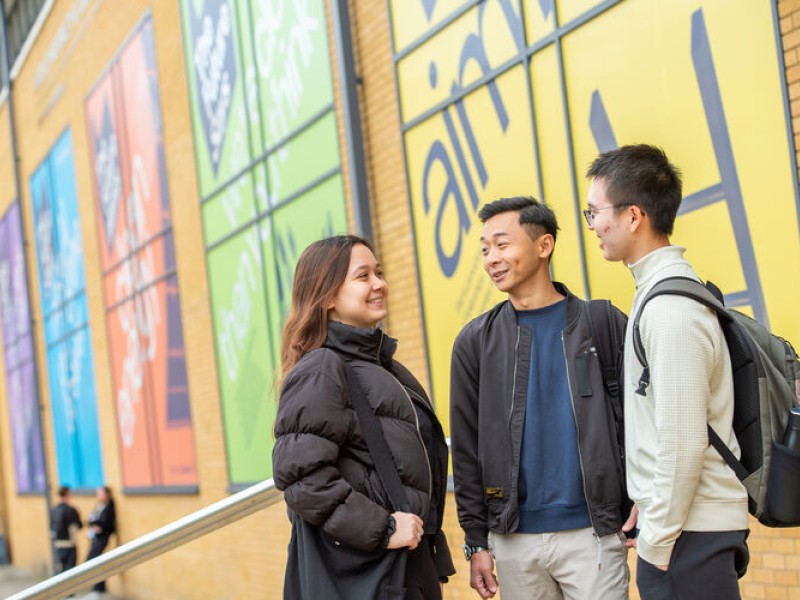
International Foundation Year
If you are an international student and you don’t meet the entry requirements for this degree, we offer the International Foundation Year at the Surrey International Study Centre. Upon successful completion, you can progress to this degree course.
Selection process
We normally make offers in terms of grades.
If you are a suitable candidate you will be invited to an offer holder event. During your visit to the University you can find out more about the course and meet staff and students.
Recognition of prior learning
We recognise that many students enter their higher education course with valuable knowledge and skills developed through a range of professional, vocational and community contexts.
If this applies to you, the recognition of prior learning (RPL) process may allow you to join a course without the formal entry requirements or enter your course at a point appropriate to your previous learning and experience.
There are restrictions on RPL for some courses and fees may be payable for certain claims. Please see the code of practice for recognition of prior learning and prior credit: taught programmes (PDF) for further information.
Contextual offers
Did you know eligible students receive support through their application to Surrey, which could include a grade reduction on offer?
Fees
Explore UKCISA’s website for more information if you are unsure whether you are a UK or overseas student. View the list of fees for all undergraduate courses.
Payment schedule
- Students with Tuition Fee Loan: the Student Loans Company pay fees in line with their schedule.
- Students without a Tuition Fee Loan: pay their fees either in full at the beginning of the programme or in two instalments as follows:
- 50% payable 10 days after the invoice date (expected to be early October of each academic year)
- 50% in January of the same academic year.
The exact date(s) will be on invoices. Students on part-time programmes where fees are paid on a modular basis, cannot pay fees by instalment.
- Sponsored students: must provide us with valid sponsorship information that covers the period of study.
Professional training placement fees
Professional Training placement year fees are approximately 20% of the full-time fee for the academic year in which you undertake your placement.
Scholarships and bursaries
Discover what scholarships and bursaries are available to support your studies.
Our award-winning Professional Training placement scheme gives you the chance to spend a year in industry, either in the UK or abroad.
We have thousands of placement providers to choose from, most of which offer pay. So, become one of our many students who have had their lives and career choices transformed.
Statistics
Placement Statistics
92%
of students who did a placement entered into graduate level employment*
80%
of placements are paid, with 60% paying between £18,000 - £30,000
48%
of our students have been offered a graduate role from their placement provider**
*Graduate Outcomes 2025, HESA
**Professional training year returners survey 2024
Politics and economics placements
You’ll be taught how to apply theoretical understandings of politics and economics to world events and issues.
Additionally, we’ll equip you with the practical skills necessary to find a placement. The aim of our Professional Training placement is to provide you with first-hand experience of how politics operates in practice. Our students have completed placements in the voluntary sector, government departments, MPs’ offices, international organisations and the private sector.
Recent placement providers for Politics and International Relations include:
- Bank of England
- ECOFEL
- House of Commons
- House of Lords
- Mapfre
- Panasonic
- UKAS External Affairs
- UN Development Office
- Unilever
- YouLend.
Applying for placements
Students are generally not placed by the University. But we offer support and guidance throughout the process, with access to a vacancy site of placement opportunities.
Find out more about the application process.
Study and work abroad
Studying at Surrey opens a world of opportunity. Take advantage of our study and work abroad partnerships, explore the world, and expand your skills for the graduate job market.
The opportunities abroad vary depending on the course, but options include study exchanges, work/research placements, summer programmes, and recent graduate internships. Financial support is available through various grants and bursaries, as well as Student Finance.
Perhaps you would like to volunteer in India or learn about Brazilian business and culture in São Paulo during your summer holidays? With 140+ opportunities in 36+ different countries worldwide, there is something for everyone. Explore your options via our search tool and find out more about our current partner universities and organisations.
Apply for your chosen course online through UCAS, with the following course and institution codes.
About the University of Surrey
Need more information?
Contact our Admissions team or talk to a current University of Surrey student online.
Terms and conditions
When you accept an offer to study at the University of Surrey, you are agreeing to follow our policies and procedures, student regulations, and terms and conditions.
We provide these terms and conditions at offer stage and are shown again at registration. You will be asked to accept these terms and conditions when you accept the offer made to you.
View our generic registration terms and conditions (PDF) for the 2025/26 academic year, as a guide on what to expect.
Disclaimer
This online prospectus has been published in advance of the academic year to which it applies.
Whilst we have done everything possible to ensure this information is accurate, some changes may happen between publishing and the start of the course.
It is important to check this website for any updates before you apply for a course with us. Read our full disclaimer.
